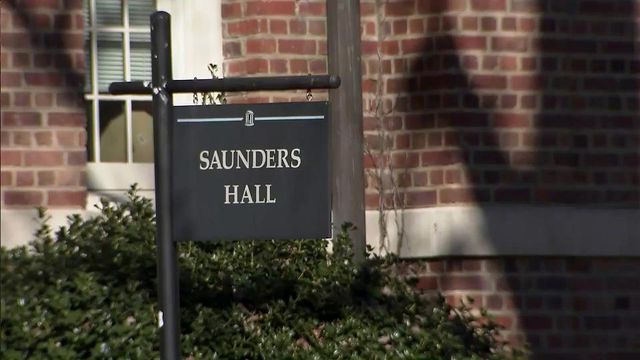UNC-CH to drop KKK leader's name from building
The Board of Trustees of UNC-Chapel Hill voted 10-3 Thursday morning to rename a building that, for more than 80 years, bore the name of a Confederate soldier and founder of the Ku Klux Klan in the state.
Posted — UpdatedWilliam Lawrence Saunders, an 1854 UNC-Chapel Hill graduate, served as a colonel in the Civil War and eventually went on to become North Carolina's secretary of state.
In 1922, UNC named the building, which originally housed the history department, for Saunders because he was instrumental in getting the state's colonial records published.
On Thursday, the board resolved to change the building name to Carolina Hall, saying that "the university made an error" in considering Saunders' Klan leadership as a qualification for the honor.
"The Klan was a violent terrorist organization," the trustees wrote in the resolution for the change.
Of the three board members who voted against the change, only Haywood Cochrane spoke to the media about that choice.
"A sense of history and a sense of different constituencies that we as a board represent was a major part of our thinking," he said of the anti-change faction.
"The critical thing is how we move forward in this."
Student and faculty activists showed up to the board meeting wearing #hurstonhall shirts, lobbying for the building to be renamed after Zora Neal Hurston, a famous black author and former UNC-Chapel Hill student.
"I think it could have been a really important statement that they could have made, that students of color are welcomed and honored at this university," graduate student Rachel Cotterman said.
Board members said they looked at several names for the building, including Hurston Hall, but they felt Carolina Hall was a unifying name.
"We wanted a name that we could reach back to where we started, where we’ve been, where we are and where we are headed," board Chairman Lowry Caudill said.
"We went and looked at the evidence, and there is not a lot of connection to Zora Neal Hurston to UNC," trustee Alston Gardner said.
Activists also were upset by the board's decision to put a 16-year freeze on renaming other campus buildings.
"We are the place where hard things get talked about. You can't freeze those discussions," said Altha Cravey, associate professor of geography.
"It's a way of shutting down conversation and preventing this democratic process from continuing in the future," Cotterman said.
Caudill said UNC-Chapel Hill officials need to take time to develop a comprehensive approach to telling the full story of the university's history.
"If we are going to do curation and education, it's going to take time," Caudill said. "We have to develop the programs, we have to do the teaching, and then you have to see, is it working.
"We wanted an extended period of time to allow this to root," he added. "We’ll be here 200 years from now, so 16 years to pause and get this right, we thought, was an appropriate thing to do."
Officials didn't set a schedule for removing Saunders' name from the building, but the name change will include a marker located on or near the building that explains who Saunders was, his role in state and university history and the changing politics that prompted the name change.
• Credits
Copyright 2024 by Capitol Broadcasting Company. All rights reserved. This material may not be published, broadcast, rewritten or redistributed.






